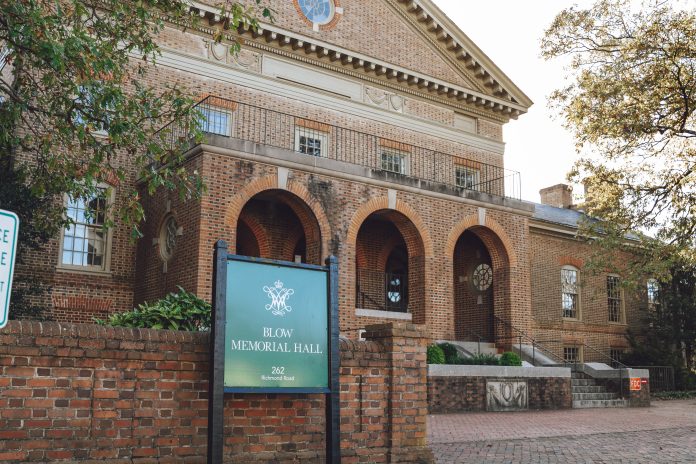Wednesday, Oct. 16, the John Quincy Adams Society at the College of William and Mary hosted Heather Brandon-Smith to discuss her work as a human rights advocate for the Friends Committee on National Legislation.
Marina Karapanos ’25, the vice president for JQAS, helped coordinate with the national JQAS organization to select Wednesday’s speaker. Karapanos explained the JQAS’s focus on restraint in foreign policy and opposition to military intervention drew the club to Brandon-Smith and the organization she represents.
“We don’t really have any courses on human rights in war or human rights specifically when it comes to the U.S. Constitution and all of that,” Karapanos said. “We do have an international law class, but it’s not specific to this topic. So it just seemed like something that students might be more interested in that they might not get regular exposure to.”
Nolan Jansorn ’27, JQAS’s media chair, echoed Karapanos’s sentiments. He feels that while the discussion of human rights is prevalent in global politics, little is done by lawmakers to preserve these rights.
“It’s important to kind of get that into the mainstream discussion of international relations so that we can then start making actual action or actual change towards solving global issues rather than just going in and talking about them all the time,” Jansorn said.
Brandon-Smith’s organization, the FCNL, is a nonpartisan lobbyist group that focuses on building relationships with Congress and the administration to promote a human-rights foreign policy focus. In her talk, Brandon-Smith highlighted the importance of being open-minded when talking to legislators.
“I think it’s really important to sort of be open-minded about particularly working with the people in power, where they come from, respecting that they’re all coming from a place, you know, of their own values and their own beliefs. But ultimately, we all want to have a safe and secure world, a safe and secure United States,” Brandon-Smith said.
Brandon-Smith recognized the difficulty in approaching these topics in a very politically polarized society, especially in an election year. She mentioned that political leaders are often fearful of being seen as weak on national security, leading to the use of military force to solve conflicts.
“This kind of notion that the use of force is the best resort to responding to this has sort of become ingrained in our consciousness and it’s really hard to dismantle,” Brandon-Smith said.
The JQAS hosted this event in the form of a moderated discussion, where Karapanos posed various questions to Brandon-Smith, covering topics from the impact of the War on Terror on human rights issues, to the ongoing human rights crises in Ukraine and Gaza.
Brandon-Smith indicated that while U.S. support for human rights in Ukraine has been unwavering, the situation in Gaza is more complex, as the U.S. government is actively sending weapons to Israel. However, she noted she is beginning to feel a little more hopeful about the situation, as 94 Congressmen and the Biden Administration are calling for a ceasefire, drawing increased attention to the human rights issues in Gaza.
In her responses, Brandon-Smith emphasized the importance of advocating for non-military means to respond to acts of terrorism. She suggested the use of law enforcement and the criminal justice system to treat acts of terrorism as crimes has proven successful and should be utilized more in place of military force.
To support her claim, Brandon-Smith discussed the arrest and sentencing of Osama bin Laden’s son-in-law, who was put on trial in the United States for his crimes and is currently serving a life sentence in a supermax prison facility. She argued these non-military means limited the civilian impact of the U.S.’s terrorism response.
Brandon-Smith also emphasized the lack of public knowledge about ongoing U.S. military missions. She asked the audience which country they thought the U.S. is currently using the most military force in. The crowd was shocked when she revealed the answer to be Somalia.
After the talk, Charlotte Harvey ’26, an international relations major at the College, revealed this part stood out to her most.
“I think the fact that the U.S. is most militarily involved in Somalia really stood out to me, just given I had no idea and neither did most people in the room,” Harvey said. “So I think the fact it is not publicized more is really interesting.”
Harvey also indicated she was struck by Brandon-Smith’s claim that instead of addressing the root causes of these issues, the U.S. almost always opts for a military response. However, Harvey was surprised to learn while the United States treats most international conflicts militarily, some more diplomatic approaches are being made.
“There are peaceful measures that are being taken legally that are helping certain conflicts. I think the media portrays the bad and criticizes the government and things like that. She enlightened us on the fact that there are actual measures in place to handle things in a less violent and in a way that doesn’t need to involve conflict,” Harvey said.

